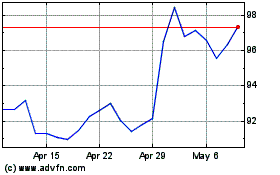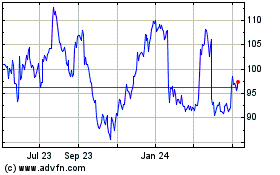By Melanie Evans and Drew Hinshaw
Hospitals and public-health officials in the U.S. and Europe are
rationing medical masks and scrounging for more, as they prepare
for a potential widening of the coronavirus epidemic.
Global hoarding has left European wholesalers with empty
shelves. Manufacturers outside China say they won't be able to fill
an exploding stack of orders for months. U.S. hospitals and
medical-supply companies have reported dwindling mask inventory and
partial or delayed shipments as the surge in global demand for
protective equipment enters a second month.
While many people in China have taken to wearing masks in
public, the U.S. Centers for Disease Control and Prevention and its
European counterparts are trying to reserve masks for health-care
workers and patients. The CDC has urged the public not to use masks
unless told to do so by a doctor.
Masks known as N95 respirators guard against the virus, but only
if used properly. Other masks don't filter out small particles
harboring the bug.
The U.S. has a stockpile of 12 million N95 masks, Health and
Human Services Secretary Alex Azar told the Senate Appropriations
Committee on Wednesday. The U.S. would need 300 million N95 masks
to respond to an emergency, he said.
A Food and Drug Administration spokeswoman said today the agency
has received reports of spot shortages and urged hospitals to
report concerns to the agency.
In New York, officials have begun drawing from government
stockpiles to fill requests from hospitals and nursing homes for
thousands of respirator masks, more than one million surgical masks
and 18,000 face shields in the past month, said Stephanie Buhle, a
spokeswoman for the New York City Department of Health and Mental
Hygiene.
NYU Langone Health, which includes about 360 outpatient centers
and four hospitals around New York, has removed all but an
emergency supply of respirator masks from many locations to create
a stockpile in case of a U.S. outbreak.
"We would love if there would be cavalry on the other side of
the hill. We have to expect they are not going to come," said Dr.
Michael Phillips, NYU Langone Health's chief epidemiologist
The stockouts are a reckoning for the West, which for decades
has outsourced the manufacture of goods including medical supplies
to China.
Manufacturers say much of the world's protective-medical gear is
made in Hubei, the quarantined province where the virus first
emerged late last year. Hubei is a global hub for producing masks,
bandages, surgical drapes and gowns, said a spokesman for Medline
Industries Inc., a Northfield, Ill., medical-supply manufacturer
and distributor.
In Europe, where more than 500 cases emerged this week, chiefly
in Italy, officials have told health-care workers to be prepared to
reuse disposable face masks because the supply from China has been
cut off.
"It is expected that there will be no deliveries to Europe as
long as the crisis persists," the Robert Koch Institute, Germany's
equivalent to the CDC, said last week.
As coronavirus spread through China weeks ago, the Vatican sent
hundreds of thousands of masks to alleviate a shortage there. Now
officials at Rome's Gemelli Hospital, where popes normally go for
medical treatment, say they are worried about where to find masks
after their current stock runs out in two months.
"There has been panic and a run on supplies," said Giovanni
Paolo D'Incecco Bayard de Volo, Gemelli Hospital's head of
procurement.
Masks are part of a wider shortage of basic goods that
health-care workers need to combat a virus that has sickened 82,585
and killed 2,814. The European Medicines Agency said it is worried
about a global medicine shortage, because many active
pharmaceutical ingredients, the basic inputs for drugs, are
produced in China. Italy's main pharmaceutical lobby this week said
it was giving drugstores a recipe to produce their own hand
sanitizer.
"Masks are just the beginning of the crisis," said Darius
Sawicki, owner of Poland-based wholesaler Medyk eRKa. His suppliers
have run out of several health-care products, including hand
sanitizer. "There is nothing we can order, because their warehouses
are empty," he said.
Officials in China have told companies making masks there to
divert their output to the fight against the domestic outbreak, The
Wall Street Journal reported earlier this month. India, Taiwan and
South Korea -- which is now grappling with its own outbreak of the
virus -- have banned the export of masks made in those places.
Some mask makers that have ramped up production outside China
say they remain reliant on raw materials produced there.
"In the next month or so, we're going to run out of components,"
said Ronald Reuben, chief executive of Medicom Group, in Montreal,
which has raised production at factories in France and Augusta, Ga.
"Europe will not be able to supply its own market."
Premier Inc., which contracts for supplies on behalf of about
2,400 U.S. hospitals, said one of its distributors recently halted
shipments of private-label masks manufactured in China. All
distributors surveyed recently by Premier said they had delivered
less than half of the medical respirators that hospitals had
ordered in the past 45 days.
U.S-based mask-makers 3M Co. and Prestige Ameritech have roughly
doubled their U.S. production since the outbreak began, to one
million masks a week, according to Premier.
3M said it had ramped up production in the U.S., Asia, Europe
and Latin America but declined to say how many masks it was
producing.
Prestige Ameritech Chief Executive Mike Bowen said he has shared
production data with Premier. He said he wants federal officials in
the future to urge U.S. hospitals to buy critical medical supplies
domestically to avoid shortage risks from a global supply
chain.
Manufacturers in the U.S. must report the location of plants to
the FDA, but other information about medical-supply production is
confidential. Hospitals often don't know where their masks were
made, which some executives said makes it difficult to predict how
they might be hit by production disruptions.
"This health crisis is highlighting the fact that the industry
lacks visibility into manufacturing-site details across the board,"
said David Gillan, an executive with Vizient Inc., another
medical-supply contractor.
--Francis X. Rocca and Natalia Ojewska contributed to this
article.
Write to Melanie Evans at Melanie.Evans@wsj.com and Drew Hinshaw
at drew.hinshaw@wsj.com
(END) Dow Jones Newswires
February 27, 2020 14:03 ET (19:03 GMT)
Copyright (c) 2020 Dow Jones & Company, Inc.
3M (NYSE:MMM)
Historical Stock Chart
From Mar 2024 to Apr 2024

3M (NYSE:MMM)
Historical Stock Chart
From Apr 2023 to Apr 2024
